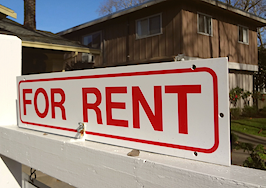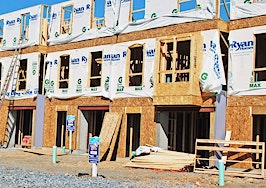In a shifting real estate market, the guidance and expertise that Inman imparts are never more valuable. Whether at our events, or with our daily news coverage and how-to journalism, we’re here to help you build your business, adopt the right tools — and make money. Join us in person in Las Vegas at Connect, and utilize your Select subscription for all the information you need to make the right decisions. When the waters get choppy, trust Inman to help you navigate.
Rent prices across the nation hit a new all-time high in July as landlords continued benefiting from high home prices and mortgage rates.
Renters who otherwise would have looked to purchase a home were forced to continue renting, giving landlords sustained strong demand that pushed prices up after a brief lull.
After a slowdown in rent growth from May to June, the median rent for a one-bedroom home jumped 2.1 percent in July, to an all-time high of $1,450 per month. That’s an 11.3 percent jump compared to July 2021, according to rental portal Zumper.
The increase was 9.3 percent year over year for two-bedroom homes, to $1,750 a month.
Zumper issues monthly reports documenting the nationwide price of rent. It is one of several rental portals that track this type of data nationally.
Similar reports have shown that, after a rapid run-up in rent prices over the past two years, renters are sending mixed signals about how much more they can continue spending each month as wages fail to keep up with inflation.
Experts believe renters who otherwise would have stayed in the buyer’s market have been priced out due to a rapid run-up in interest rates paired with record-high home sale prices. But after rents were pushed up to record highs, some renters may be looking at other options.
“These swirling forces are creating a head-scratching reality for the rental industry,” Zumper said in its report. “Some property owners have become accustomed to double-digit percentage hikes and will continue chasing these inflated prices for as long as they can.”
“But the fear of recession is real, and many renters are making lifestyle sacrifices so they no longer have to fork over 50 percent of their income (or more) on housing,” the report said.
People who spend more than 30 percent of their net monthly income on housing are considered cost-burdened. Those who spend 50 percent or more are considered to be severely cost-burdened.
Rent has begun to rebound in San Francisco, which was hit hard by the the pandemic. In that city, rent now clocks in at $3,100 a month for a one-bedroom apartment, the highest since July 2020. San Francisco remains the most expensive place to rent a two-bedroom home, which now runs approximately $4,170 a month.
New York remains the most expensive market in the nation for one-bedroom units. Renters in the Big Apple pay a median price of $3,780 a month, or $4,150 a month for two bedrooms.
“Rent prices will keep climbing across much of the country,” Zumper CEO Anthemos Georgiades said in a statement. “But the stratospheric price hikes we saw throughout much of the pandemic will likely slow as consumers continue to tighten their wallets.”













